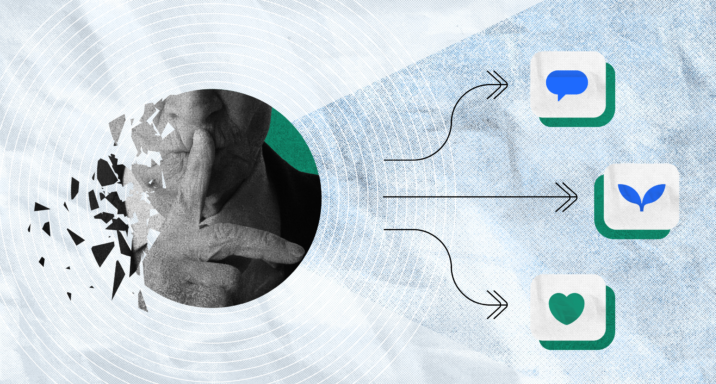When author Rebecca Carrell recounted her experience with an anxiety disorder, her doctor asked, “What would you do if one of your children didn’t make enough insulin?” Rebecca answered, “I would make them take insulin shots … because when the body doesn’t make enough of something, you need external help.” Her doctor replied, “Your brain does not make enough serotonin or dopamine … Unless you fix your serotonin levels, you will continue to struggle.” Rebecca’s eyes filled with tears.
As she recalls in her article, “When the Brain Betrays the Body,” Rebecca came to accept
that the sovereign Lord who “knit me together in my mother’s womb” could have given me fully functioning neurotransmitters and receptors, but he didn’t. … [The apostle Paul’s protégé] Timothy needed to take wine for his stomach; I take meds for my serotonin levels (1 Tim 5:23).
Rebecca’s anxiety was not “all in her head.” Yet sadly the only shame she ever felt about her affliction came at the hands of Christians who misapplied Paul’s exhortation to “be anxious for nothing” (Phil 4:6 NKJV). But the word “be anxious” (μεριμνάω) in Paul’s letter to the Philippians relates to worrying; the word “anxiety” in “anxiety disorder” relates to a hormone deficiency.
A robust theology of the body serves as a correction to the idea that spiritual failure is at the root of all physical (including mental) ailments. To suggest that a cause-and-effect relationship always exists between sin and suffering is a form of the prosperity gospel. Such a belief leaves people patting themselves on the back if they’re in good health but blaming themselves for their illnesses. The book of Job reminds readers that the righteous may suffer through no fault of their own (Job 1:8).
Instead, we recognize that our Christianity is rooted in our physicality. The first chapters of Genesis describes God creating matter and calling it good, followed by God creating male and female bodies and calling them very good. The incarnation of Jesus adds special dignity to humanity’s physicality. And the death, resurrection, and ascension of Christ—along with the promise of his physical return and the restoration of the earth—all point to the goodness of matter and embodiment.
But we see something else in those first chapters of Genesis: that we live in a world ravaged by the effects of sin. Consequently, our bodies suffer and they often do so in ways we cannot see.
What is mental health?
So what exactly is mental health? According to the CDC, “mental health includes our emotional, psychological, and social well-being.” I would add that it also includes our spiritual well-being. Mental health influences every part of our lives down to how we cope with a flat tire, a Zoom call that runs overtime, or the temptation to doom-scroll while binging on chocolate.
Mental health disorders are among the leading causes of ill-health and disability worldwide. And they’re nothing new. For instance, many believe the prophet Elijah (9th cent. BC) battled depression (see 1 Kgs 19:4–14).
Many people among us suffer from mental health challenges. In fact, maybe you’re one of them. According to the World Health Organization, one out of every four people will experience (or already experiences) a mental or neurological disorder. The 2020 Healthy Minds study found that, among students, 39 percent reported depression and 34 percent reported an anxiety disorder. Globally, “One out of every two people in the world will develop a mental health disorder in their lifetime.”
That’s a lot of suffering. And sometimes stigma in faith communities can make it more difficult for those suffering to seek help.
Its internal causes
Our physiology can affect our mental health.1
Some physical conditions such as Parkinson’s disease, multiple sclerosis, diabetes, and postpartum changes can impact one’s mental health. Add to these the emotional pain of under-employment due to headaches, limits on social mobility due to MS, or the loss of independence due to Parkinson’s—and a patient can lose self-confidence and feel hopeless. Medical bills mount up. Doctor visits interrupt schedules. Navigating a wheelchair can cause frustration. A person with a disease affecting digestion might have to eat bland food—as if the disease itself weren’t bad enough. Someone recuperating from a stroke misses baby showers, graduations, and family dinners; and they also miss the mental health benefits of attending church.
Harvard T. H. Chan School of Public Health epidemiology professor Tyler VanderWeele writes in Harvard Public Health about the link between a decline in church attendance and a decline in mental health:
A major 2022 systematic review in the Journal of the American Medical Association documented 215 studies, each with sample sizes over 1,000 participants, using longitudinal data to evaluate the relationship between religion and health. The evidence … suggests that weekly religious service attendance is longitudinally associated with lower mortality risk, lower depression, less suicide, better cardiovascular disease survival, better health behaviors, and greater marital stability, happiness, and purpose in life.
Its external factors
In addition, certain environmental or external conditions can agitate our mental health.
Maybe the boss requires long hours at work, wearing a person down over years of service. Or after losing a job someone finds it difficult to find a new one. A young adult gambles away four years’ worth of tuition the parents had saved. Such long-term stresses can also affect mental health.
Trauma also contributes. The following traumas have been linked with elevated risk of poor mental health outcomes:
Depression can also result from enduring medical conditions such as cancer, diabetes, or infertility; biological factors or brain-chemistry imbalances; abuse of alcohol or drugs; long-term feelings of loneliness or isolation; and pharmaceuticals for which depression is a possible side-effect.
Ways to help
Someone you love probably suffers from a mental-health challenge. Here are five ways we can offer Christ’s love.
1. Pray and be present
Intercede for the suffering. Then show up and care. Let people talk about their pain if they wish. But if not—no need to speak.
2. Resist giving unsolicited advice
Survivors have probably tried all the logical solutions and explored a few seemingly illogical ones. Advice can come across as blame and evoke feelings of failure. Job’s friends did well the week when they remained silent, but they added to the suffering when they began offering advice.
3. Keep inviting
Those who hurt may turn down invitations, but keep inviting through notes or texts, which reminds people you want them around.
4. Provide tangible care
When someone falls ill, gets injured, or dies, people provide gift cards, run errands, and drop off scalloped potatoes. They might also mow the lawn, send flowers, or clean toilets. Look around. Does someone with a non-visible difficulty need your visible expressions of care?
5. Help remove the stigma
The number-one reason people avoid getting help is the stigma surround mental health. We can be part of normalizing talk about depression, seeking counseling, and using resources.
Conclusion
Remember the man born blind? Jesus’s disciples ask who sinned, the man or his parents. Jesus answered that nobody’s sin had caused the man’s blindness (John 9:1–4). It’s not a sin to be blind. Neither is it a sin to have a serotonin imbalance or misfiring brain wiring. In fact, it’s cruel to suggest such. The prophet Ezekiel chastised shepherds saying,
You have not strengthened the weak or healed the sick or bound up the injured. You have not brought back the strays or searched for the lost. (Ezek 34:4 NIV)
Like the recipients of Ezekiel’s admonition, we add to people’s suffering if we criticize or blame them rather than showing mercy. Instead, we need to shepherd people by caring well.
If you are affected by one of the more than two hundred kinds of mental illness, please tell your story. If you’ve told it and heard Bible verses misapplied in response, keep telling it anyway. The body of Christ needs you. When one suffers, we all suffer (1 Cor 12:26). Please don’t suffer alone.
Related articles
- Mental Illness and Ministry: A “Whole-Person” Pastoral Approach
- 22 Bible Verses for Anxiety (+ a Prayer)
- How to Care for a Friend Experiencing Mental Illness
Resources you may find helpful
A Quiet Mind to Suffer With: Mental Illness, Trauma, and the Death of Christ
Regular price: $13.99
Finding Hope in a Dark Place: Facing Loneliness, Depression, and Anxiety with the Power of Grace
Regular price: $11.99





